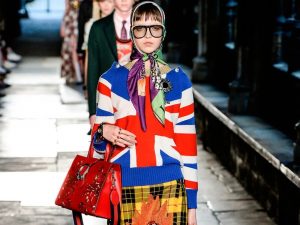
The Value of The UK Fashion Industry
The direct value of the UK fashion industry to the UK economy is nearly £21 billion according to a major research study.
On top of this, fashion’s wider contribution to the economy (known as the indirect, induced and ‘spillover’ effects) in influencing spending in other industries, ranging from IT to tourism, is calculated as more than £16 billion.
This means that, including direct, indirect, induced and ‘spill over’ effects, the fashion industry’s total contribution to the UK economy is estimated to stand at over £37 billion.
The ‘Value of the UK Fashion Industry’ report, commissioned by the British Fashion Council, defines the industry and analyses the true breadth and economic value of the UK fashion industry for the first time.
The industry’s direct economic contribution to UK GDP was collated by analysing the industry’s profits and wages (known as gross value added (GVA)) across a wide range of fashion products and items – including womenswear and menswear through to handbags and shoes – plus the contribution of fashion education, fashion marketing and fashion media.
The report also highlights the pivotal role of cutting edge British design, and showcasing events such as London Fashion Week, in driving innovation and growth within the industry itself, as well as attracting millions of visitors from across the globe to the UK every year.
Factors behind the growth of the fashion industry cited in the report include:
• the desire and demand created by the top end designer sector and its influence on and diffusion the mainstream – i.e. high street retailers (including department stores) and supermarkets
• the expansion of fashion brands into other product lines beyond clothing (i.e. perfume, accessories, homeware etc.)
Economic consultants, Oxford Economics, researched and wrote the report, and it was funded by a range of cross-sector organisations including: the London Development Agency (LDA), UKTI, British Fashion Council, UK Fashion & Textile Association (UKFT), Aurora Fashions, House of Fraser, Debenhams, Land Securities, Marks & Spencer and New Look. The report follows the findings of industry wide consultation.
The research highlights the huge breadth and scope of the UK fashion industry today, highlighting how it encompasses a wide range of professions – from fashion designers, through to manufacturers, fashion retailers, magazine publishers, journalists, fashion marketeers, course lecturers and business managers.
The report shows that the modern UK fashion industry:
• directly employs 816,000 people across a wide range of jobs and is the largest employer of all the creative industries
• is the 15th largest industry (out of 81) in UK – similar in size to the food / beverage services and telecommunications industries and bigger than the wholesale and retail of automotives, sports activities, chemical manufacture and advertising/video sectors
• is evolving and innovating – with growth in online fashion retail, sustainable clothing lines, as well as modern textile R&D and manufacturing – such as sweat resistant sports fabrics.
• has some of the best fashion colleges, designers and retailers in the world
• drives tourism with its highly desirable high street and shopping hubs
The report highlights key challenges facing the sector:
• a lack of business skills among many smaller fashion businesses
• limited awareness of the diverse opportunities in the fashion industry amongst young people and career advisors
• impact of the recession and limited access to investment for the fashion manufacturing and designer sectors
• growing international competition from other showcasing capitals which could challenge London Fashion Week’s and London’s reputation as the most creative capital
• the (long term) need to incentivise and encourage growth of UK manufacturing base
• promoting existing best practice on sustainability and working together with Government to implement its Sustainable Clothing Action Plan in this area
The study concludes by citing activities that would help ensure the future growth and success of the industry including:
• a national campaign to promote the diversity of careers to young people combined with the promotion of greater business teaching in fashion courses
• a cross-sector long term strategy and plan to showcase UK fashion design to help it stay ahead of the international competition
• support for high-skilled manufacturing
• provision of greater funding and co-ordinated business support for young fashion design businesses to reduce their high fold rate
Harold Tillman CBE, former Chairman of the British Fashion Council and former Chairman of Aquascutum and Jaeger commented: “Fashion is a great British success story and this landmark piece of research underlines its true scope and economic impact. This is just the first step, to creating a detailed national action plan for the industry which will help to support its future growth and success.”
Former Minister for the Creative Industries, Ed Vaizey said: “British Fashion has the talent, creativity and skills to rival anywhere in the world. Our new and established designers and fashion labels are internationally renowned for their unique vision at the cutting edge of this hugely important global industry.
“This research shows that fashion makes a significant contribution to the UK economy and confirms British fashion’s status as one of our most important creative industries. I look forward to continuing to work with the British Fashion Council to make sure that the Government does what it can to further support the industry.”









